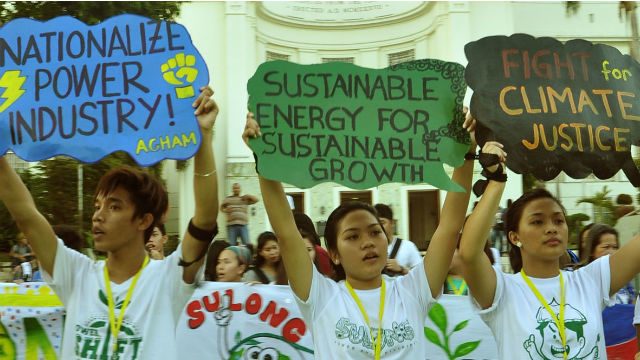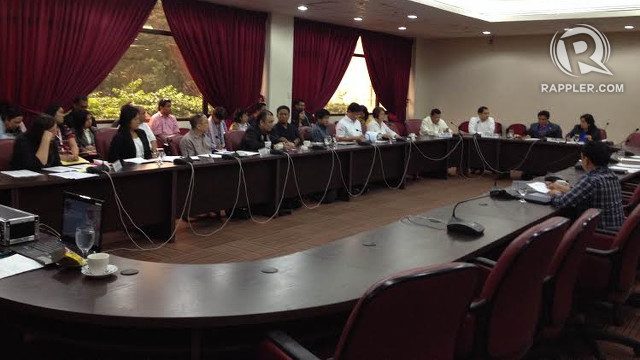SUMMARY
This is AI generated summarization, which may have errors. For context, always refer to the full article.

MANILA, Philippines – Two weeks before the deadline of national commitments to a global climate deal, the Philippine commitment appears threatened by disagreements between government agencies.
On Monday, September 14, a House hearing discussing the country’s climate pledges revealed concerns from some sectors over the lack of transparency in the way the pledges are being crafted by the Climate Change Commission (CCC).
Climate Change Commissioner and Secretary Lucille Sering defended herself against allegations by the Department of Agriculture’s Alicia Ilaga that certain sectors weren’t being consulted on the Philippine’s climate action plan.
The hearing sought to find out the status of the country’s Intended Nationally Determined Contribution (INDC), a document that should be submitted to the United Nations on October 1, only two weeks away.
The INDC is a list of initiatives each country promises to do to prepare for and mitigate climate change. Countries’ INDCs will become a vital component of the global climate deal to be forged in a landmark Paris summit in December. (READ: What’s happening in Paris in December? 10 things to know)
The CCC is the lead agency in crafting the INDC. Sering presented the “initial” mitigation commitment of the country, or the commitment to lower the country’s carbon emissions.
So far, the commitment only comprises carbon emission reduction targets for the energy and transport sector, the two biggest sources of emissions in the country.
Sering explained that the CCC conducted several consultations with key government agencies; businessmen in affected sectors like energy, waste management, and transportation; civil society groups; and the academe.
But apparently, some sectors were left out.
“[The department] has invited the Commission 3 times to explain the INDC and our position in Paris but they were not entertained because the Commission was busy,” said Ilaga, who heads climate change efforts in the DA and negotiates for the country in international climate conferences.
A visibly distraught Sering replied: “The DA had been ignoring our invitation… I tried to sit down with them but they don’t want to.”
Agricultural sector compromised
The lack of consultation has led to an initial INDC that does not take into consideration the concerns of the agricultural sector, said Ilaga.
Thus, it came as no surprise that the DA’s official stance, read by Ilaga, opposes the INDC.
She explained that the proposed reductions of emissions from energy and transportation could compromise the growth of the country’s agricultural sector.

For instance, the target reductions could entail a limit on building farm-to-market roads or energy-reliant post-harvest facilities for farmers.
“Although the agricultural sector is exempted in the proposed mitigation INDC, the mitigation commitments in the energy and transport sectors will greatly affect the support services to agriculture. Post-production inputs for fisheries and agriculture heavily rely on these two sectors,” said Ilaga.
Sering countered that the DA’s assertion was baseless.
“We went through the numbers one by one. No cost [to agriculture]. And if they’re saying it will increase the prices of agriculture, please tell us by numbers,” she said.
Reading the official position of her department, Ilaga questioned the Commission’s determination to include emission reduction targets when the Philippines is a developing country that may not be able to meet such targets given its growing economy.
“The scope of INDC is left open without stress on mitigation. It is up to developing countries according to their national circumstances and priorities to decide what is best for them,” she said.
Leadership
AKP party list Representative Rodel Batocabe, chair of the Special Committee on Climate Change, sought to mediate between the two officials. But he advised Sering to listen to the aggrieved parties.
“What is clear now is that there is conflict between agencies so as a good leader you must also build consensus, especially now that we are going to Paris to negotiate. We cannot negotiate that we have different opinions. So let us build consensus here. We should not divide; we should unite,” he said.
Government agencies like the DA are not the only ones feeling left out in the INDC crafting process.
“The deadline is two weeks from now and no one has seen the draft,” Ben Muni, a climate campaigner for Greenpeace, said after the hearing.
And though the Commission held a consultation with civil society groups on July 24, those who attended said they did not feel they had been genuinely consulted.
“We didn’t see the draft. Our inputs weren’t required. It was merely a presentation of how they are coming up with the INDC,” said Gene Ferrer of Aksyon Klima in a previous interview.
It seems that, even within the Commission, there are differing views on how the INDC should be prepared.
“The very requisite of the INDC is that you should be transparent because there should be an exchange of view points. There should be a substantive debate,” Climate Change Commissioner Heherson Alvarez said in a previous interview.
Innovative approaches
International think tank World Resources Institute says INDC preparations by countries should be transparent in order to foster trust between governments and citizens, and among countries.
It cited some Latin American countries that took innovative approaches to transparently craft their INDCs.
Mexico, for example, held an INDC workshop for civil society and launched a public online consultation the next month. Last March, it became the first developing country to submit its INDC.
Chile ran a 4-month public consultation listing mitigation efforts and calling for public comment. Brazil released an online questionnaire after public meetings with civil society.
Sering said the Philippines plans to submit its INDC by the end of September. She said it would likely be a two-pager document that will detail the country’s mitigation and adaptation efforts. – Rappler.com
Add a comment
How does this make you feel?
There are no comments yet. Add your comment to start the conversation.